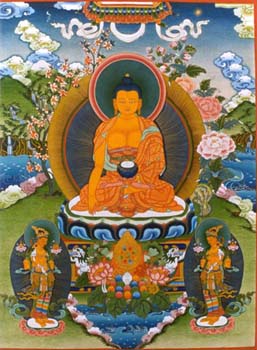Buddhist Cosmology
![]()

Buddhism is the study of how to be immeasurably happy.
Buddhism is simply a methodology, a way of becoming one with the part of ourselves that is happy.
The Buddhist message is a message not of the negation of life, but one of affirmation.
From my own personal encounters and studies with both Tantric and Zen Buddhist monks, I have found them to be humorous, warm, charming, and compassionate.

Humor enables us to deal with and overcome many of the most painful and difficult situations in our lives.
The essence of all practice is to be cool. Life is not worth getting excited about because whatever you perceive is an illusion.
The essential premise of Buddhism is that there is enlightenment, there is nirvana. Beyond this world, beyond all worlds, there's something radiant, perfect and eternal.
Even though it's not perceivable to the mind or senses, it's there and enlightenment is absolute freedom.
Buddhism isn't about temples, and incense, and shaved heads, and robes. It's not about church. There are aspects of Buddhism that involve that. People enjoy that, it helps them, it strengthens their practice.
The Buddha gave his first talks, and three or four ascetics became his first disciples. They recognized his enlightenment.
Over a period of years he collected thousands of discples. Many became his students. Many didn't become his students but whenever he was in town they would go and see him.

Some tried to kill him; there were assassination attempts. Some hated him ... this is par for the course.
A time comes when it isn't enough to read about Buddha, we wish to have that happen to ourselves. That's when we move from the exoteric to the esoteric, from religion to mysticism.
Real Buddhism is about meditation.
Buddhism is yoga. Yoga started, who knows when? A long time ago, when the first person found that they could still their thoughts and experience eternity and access the higher planes of mind.
Occasionally, in each age and in different lands, a Buddha is born, that is to say, an enlightened person…they re-codify the ways, the practices, they make changes that are just intelligent changes that adapt to a new century, a new culture.
Buddhism has existed forever, just like we have, and occasionally it's codified; it's put together into a system by someone who likes to codify.
Buddhism doesn't come from anybody. It exists by itself.
Buddhism suggests there are no elect. Everything rests upon your own self-effort, which is the good news because that means you don't have to wait around for some nebulous God to help you.
The thing about Buddhism is that it stresses attainment of something ineffable, that is where it differs from other religions in that it's more correct. We live in a world with promises of paradise.
The realms of light exist everywhere forever. But it is up to an individual to raise their mind to a level of stillness at which they can perceive these most beautiful realms of light.
Any individual is capable of realizing the truth at any time. No tradition is necessary, no chain, no lineage. Once you have realized the truth, once you have become consciousness itself, then you go beyond all such distinctions.
Buddhists believe that you are who you are today is because of who you have been in all your past lives.
Buddhism is the study of changing who we are, modifying or perhaps totally restructuring ourselves as perceivers.

Buddhism is the study of power initially. It takes a certain amount of power to even know your potential - to have the sense that you can change the way you perceive.
Life is the power to perceive. Without perception, there is no life. Buddhism is the study of perception, and what is most endemic to perception is power.
Buddhism is perception, gaining control of the mind and directing one's attention, to raise the kundalini energy so that it flows with such volatility and force that we simply perceive life correctly.
Behind the transient reality, there is something else. It is a deeper, more permanent and unchanging reality that we Buddhists call nirvana.
It is the Buddhist belief that all things, experiences and people are inherently empty. That is a simple way of saying that all physical and nonphysical things have another side.
In the Far Eastern languages we have many different words to describe the varying degrees of reality that a thing, a state of mind or plane of being may have.
All of the universes are but phantoms, mirages, and while they have their own essence, their own pantomime -- they pass forgotten.
Everything goes through the cycle of birth, growth, maturation, decay and death. But all of this is an illusion. Everything we see is an illusion. Even our perceptions of truth are illusory, illusory in the sense they're not complete.
Buddhism leads you to the awareness that all things are holy. Everything is holy. The dark has its own light, in other words.
In Buddhism we don't really believe in sin and salvation as Westerners would define them. We believe in the limitless possibilities of the present and of future moments.
What is evil? There is no such thing. In Buddhism we don't recognize evil and therefore we don't give it any power over us.
Everything aids everything because all things are a reflection of the Buddha mind or the mind of enlightenment.

The days of infinity are endless. Its hours cannot be counted or found on a clock. There is no north, south, east, or west. These are just concepts. Infinity is forever, everywhere all at once. And that's all there is.
Things are not necessarily logical. Logic is a secondary source reference. Everything is what it is. We have decided to apply rationale to things. It makes us feel better.
Human beings have become so afraid of the unknown, themselves, and each other that they deprive themselves of that innate ecstasy and love of life which comes with a human body, mind and spirit, by hiding behind the empty shell of their ego.
Self discovery doesn't not seek to bring you answers about your personal life or philosophically comfort you about life and death. What it does is bring you into reality as perception itself.
The Buddhist mindset seeks to eliminate the self. That is to say, what we want to experience is life, not self. When there's less self and more life, we're very content, and when there's more self and less life we're quite unhappy.
The dialectical change of mind that occurs in Buddhism is not simply the assimilation of a new philosophical basis or religious basis for viewing and interpreting experience. Rather it is the complete structural revision of that which is.
As long as we remain self-reflective and keep looking at who and what we are, as long as we keep our analysis that way, then there's no freedom. We're just trying clothes on in front of a mirror and admiring them.
The purpose of all our explanations is not to have you understand anything, but for you to snap from the understanding of the intellect to the understanding of pure spirit. All our explanations work backwards.
Buddhism is the study of the way the mind works. One has to be able to hold a large number of relational concepts simultaneously in the mind. It is necessary to grid, to literally unlock realities and dimensions with the power of your mind.
Buddhism is all about secrets.
Knowledge of the Enlightenment Cycle, of the ways that inner dimensions and nirvana work, lifts you far above the transient sorrows, pains, pleasures and joys that the unenlightened masses experience.
The pathway to enlightenment is beautiful. There are a lot of wonderful things that happen along the way. Win or lose, you just keep going, and it happens eventually.
The planes of light, are happiness. They are all different and are all endless. They border the shores of nirvana, which is beyond discussion - a condition of perfection that cannot be expressed.
Determine where you are and where you wish to be. Then use all of your self-effort to make that happen, following the guiding principles of all the Buddhas and bohisattvas and seekers of the dharma, of enlightenment.
Beyond learning and unlearning is awareness, and beyond awareness is consciousness, and beyond consciousness is immortality, and beyond immortality is dharma and beyond dharma is nirvana.
